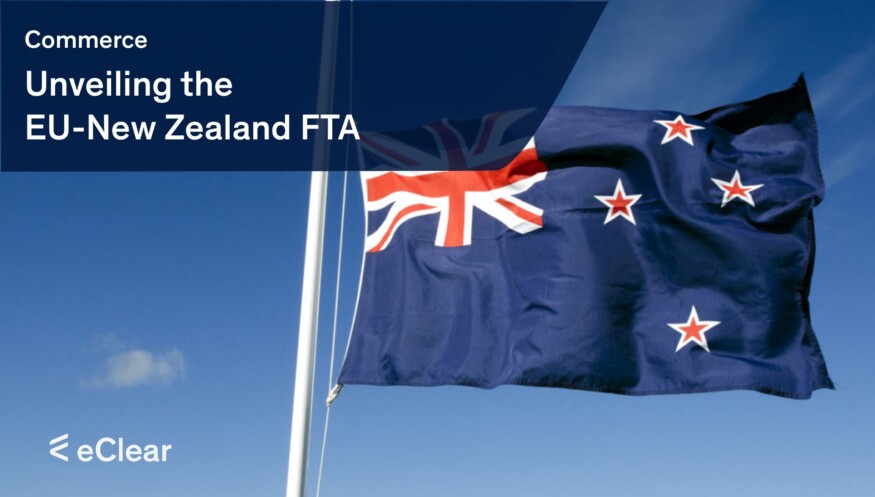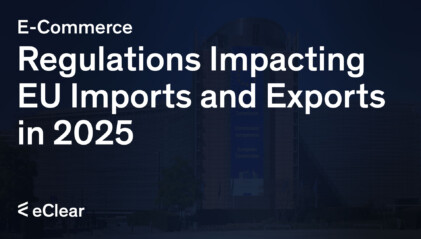The EU-New Zealand Free Trade Agreement, effective from early 2024, marks a significant step in international trade, potentially boosting bilateral trade by 30%. This agreement, which saw bilateral trade reach €9.1 billion in 2022, aims to eliminate tariffs, potentially saving businesses €140 million annually. It will gradually remove 98.5% of EU tariffs on New Zealand goods over seven years, benefiting sectors like clothing, chemicals, and wine while protecting European agricultural interests. The FTA is also notable for its commitment to sustainable trade, enforcing the Paris Agreement and ILO labour standards, and introducing sanctions for climate and labour violations. It also includes a unique article on trade and gender equality, highlighting its progressive stance.
EU-New Zealand Free Trade Agreement: Prioritising Customs and Trade Facilitation
This agreement emphasises customs and trade facilitation, underlining the importance of efficient border procedures for smooth cross-border trade. It introduces measures aimed at streamlining customs processes, lessening administrative burdens, and hastening goods clearance.
Key Measures for Enhanced Customs Efficiency
- Simplified Customs Documentation and Procedures: Reduces complexity in import and export processes.
- Electronic Customs Procedures: Enables quicker customs declarations processing and minimises paperwork.
- Risk Management-Based Customs Controls: Focuses on high-risk shipments while speeding up clearance for low-risk ones, optimising resource use.
- Enhanced Transparency in Customs Regulations: Offers businesses transparent tariffs, procedures, and requirements information.
- Provisions for SMEs: Simplified digital procedures to aid their cross-border trade involvement.
- Bilateral Cumulation: Allows materials from New Zealand to be considered as originating in the EU and vice versa.
- Commitment to High Standards: Ensures efficient, equitable trade practices.
Focus on SMEs
The agreement includes a specific chapter on SMEs, acknowledging their vital role in the economic health of both regions. It provides measures to support SMEs in cross-border trade and investment.
Key Aspects of the SME Chapter:
- Streamlined Customs for SMEs: Offers simplified procedures and reduced paperwork for quicker goods movement.
- Access to Information: Provides detailed, current data on regulations, market trends, and support initiatives.
- Promoting SME Cooperation: Encourages EU-New Zealand SME partnerships through various collaborative initiatives.
- Targeted Financial Support: Provides SMEs with financial aid such as grants, loans, and risk-sharing tools for international growth and innovation.
Digital Trade and E-Invoicing
In an increasingly digitalised world, the EU-New Zealand FTA embraces the transformative power of digital technologies by promoting e-invoicing and paperless trading. These advancements offer many benefits for SMEs, streamlining processes, enhancing efficiency, and reducing costs.
Beyond e-invoicing, the FTA’s digital trade provisions promote a broader shift towards paperless trading, encompassing electronic contracts, electronic signatures, and digital customs procedures. These advancements further streamline cross-border commerce, creating a more efficient and transparent trading environment for SMEs.
VAT Considerations
The EU-New Zealand Free Trade Agreement addresses the application of Value-Added Tax (VAT) in cross-border transactions, aiming to ensure a fair and transparent VAT regime that facilitates trade and minimises business administrative burdens.
VAT, a consumption tax levied on goods and services, can pose challenges for businesses engaged in cross-border trade. The EU-New Zealand FTA introduces measures to streamline VAT procedures and clarify VAT treatment, particularly for low-value shipments and business-to-consumer (B2C) transactions.
Low-Value Shipments
To address the complexities of VAT collection on low-value shipments, the FTA introduces a simplified VAT collection mechanism known as the Import-One-Stop Shop (IOSS). Under the IOSS, businesses register with a single EU tax authority and collect and remit VAT on all shipments with a value of less than €150 into the EU. This system simplifies VAT compliance for businesses and ensures a consistent VAT treatment for consumers across the EU.
The FTA also enhances transparency and cooperation between EU and New Zealand tax authorities regarding B2C transactions. This includes exchanging information on B2C VAT registration and compliance, facilitating effective VAT administration and ensuring businesses comply with their VAT obligations.
The EU-New Zealand Free Trade Agreement: A Catalyst for Economic Growth
The EU-New Zealand Free Trade Agreement marks a significant milestone in strengthening the economic ties between the two regions. The FTA is poised to generate substantial economic benefits for both parties by fostering a favourable investment environment and liberalising service trade.
Investment Opportunities
The FTA establishes a robust investment protection and promotion framework, providing investors greater security and predictability. This includes:
- Fair and Non-discriminatory Treatment: EU and New Zealand investors enjoy national and most-favoured nation (MFN) treatment, ensuring they are treated equally to domestic investors.
- Protection against Expropriation and Other Adverse Measures: Investors are safeguarded from measures that could harm their investments.
- Robust Dispute Settlement Mechanism: A mechanism exists to resolve investment disputes between investors and governments.
These measures, coupled with the solid economic fundamentals of both regions, create an attractive investment destination for businesses seeking global expansion.
Services Trade Liberalisation: Expanding Markets and Opportunities
The FTA significantly liberalises trade in services, encompassing a wide range of sectors:
- Professional Services: Legal, accounting, and engineering services
- Business Services: Management consulting, advertising, and market research
- Information Technology and Related Services: Software development, data processing, and telecommunications
Under the FTA, EU and New Zealand service providers will enjoy enhanced market access, including:
- Reduced Restrictions on Service Supply: Many restrictions on service provision are eliminated, allowing businesses to operate more freely.
- Non-discriminatory Treatment: Equal treatment for service providers from both regions ensures fair competition.
- Transparent Regulatory Environment: Governments must maintain transparent regulations, providing businesses with clear guidance.
These measures will enable businesses to expand their service offerings, reach new customers, and tap into new markets, fostering innovation, competition, and economic growth.
- Shared Prosperity Increased Investment Flows: Attracted by the favourable investment climate, businesses will invest more, stimulating economic activity and job creation.
- Enhanced Trade in Services: Open services markets will expand business opportunities, increasing exports and economic growth.
- Improved Productivity and Innovation: Fostered by competition and innovation, productivity will improve, lifting living standards for both regions.
- Stronger Economic Ties: Strengthening economic ties will promote cooperation and collaboration in various areas, furthering economic growth.
Emphasising Sustainability
The EU-New Zealand Free Trade Agreement prioritises sustainability and environmental protection, fostering responsible trade practices. The FTA promotes the trade of environmentally friendly goods and services, known as “green goods,” which contribute to environmental protection and resource conservation. It also incorporates environmental trade clauses that safeguard the environment and promote sustainable practices, demonstrating a strong commitment to sustainable trade.
Protecting Regional Specialities and Enhancing Consumer Trust
The EU-New Zealand Free Trade Agreement prioritises the protection of geographical indications (GIs), safeguarding regional identities, promoting fair trade, and enhancing consumer trust. GIs are distinctive signs that identify a product as originating from a specific geographical location, where its quality, reputation, or other characteristics are essentially attributed to its geographical origin.
The FTA’s robust GI protection extends beyond consumer protection and fair trade, promoting sustainable production practices. By recognising and protecting GIs, the FTA incentivises producers to adhere to traditional production methods and maintain the environmental and ethical standards associated with the region of origin. This contributes to sustainable resource use, preservation of cultural heritage, and ethical labour practices.
Technical Standards and Sanitary Measures
The EU-New Zealand Free Trade Agreement facilitates trade while ensuring safety by promoting harmonisation, transparency, and a risk-based approach to technical standards and sanitary and phytosanitary (SPS) measures. This approach reduces regulatory divergence, enhances predictability, and tailors measures to specific risks, fostering a more conducive environment for cross-border trade.
The Role of Dispute Resolution in EU-New Zealand Trade
The EU-New Zealand Free Trade Agreement establishes a comprehensive and effective dispute settlement mechanism to ensure the proper implementation and enforcement of the agreement’s provisions. This mechanism, based on principles of transparency, impartiality, and procedural fairness, aims to resolve disputes promptly and amicably while upholding the rights of both parties.
The FTA’s dispute settlement mechanism employs a two-tiered structure:
- Consultations: The first tier involves consultations between the parties to address the dispute informally. This initial stage encourages dialogue and cooperation, seeking to resolve the issue through mutual understanding and agreement.
- Panel and Appellate Review: If consultations fail to resolve the dispute, the parties may escalate the matter to a panel of independent experts. The panel conducts a review, issues a ruling, and recommends measures for compliance. Both parties have the right to appeal the panel’s ruling to an Appellate Body composed of independent experts with recognised expertise in international trade law.
The Future of EU-New Zealand Economic Relations
The EU-New Zealand Free Trade Agreement represents a landmark achievement in bilateral relations, paving the way for a future of enhanced economic cooperation, sustainable development, and mutual prosperity. Its comprehensive provisions, encompassing trade in goods and services, investment, intellectual property rights, and environmental considerations, offer a multifaceted approach to strengthening ties between the two regions.
The FTA’s implementation is expected to generate significant long-term benefits, including:
- Increased trade and investment flows: The FTA is projected to boost bilateral trade and investment, creating new business opportunities, fostering job creation, and promoting economic growth.
- Enhanced efficiency and competitiveness: The FTA’s streamlined customs procedures, reduced trade barriers, and harmonised regulations are expected to improve efficiency and competitiveness for businesses across various sectors.
- Promoted innovation and technology transfer: The FTA’s provisions on intellectual property rights and collaboration in research and development will encourage innovation and facilitate technology transfer between the EU and New Zealand.
- Strengthened environmental protection: The FTA’s commitment to sustainable development and ecological protection will promote responsible trade practices, encourage sustainable production methods, and safeguard the environment.
- The FTA establishes a framework for ongoing engagement and cooperation, ensuring its continued relevance and adaptability to evolving economic and technological landscapes. Regular reviews and joint committees will facilitate the exchange of information, address emerging issues, and explore new opportunities for collaboration.
The EU-New Zealand FTA is a model for future trade agreements, demonstrating a commitment to comprehensive, inclusive, and sustainable trade practices. It is a testament to the strong partnership between the EU and New Zealand, fostering a future of shared prosperity, environmental stewardship, and mutual respect.







